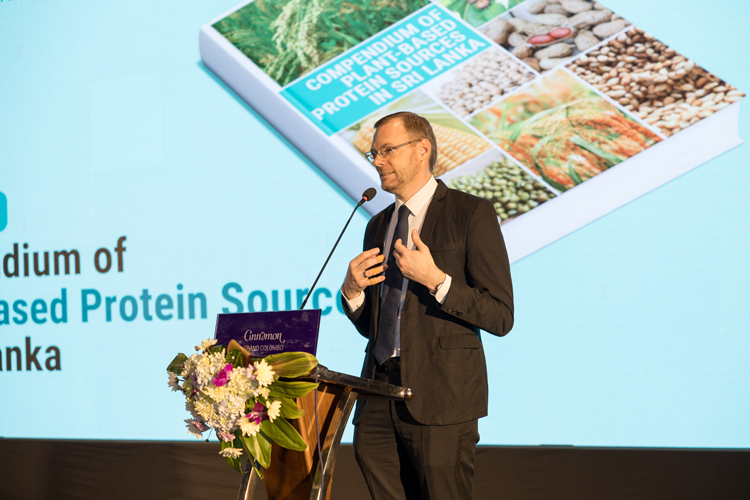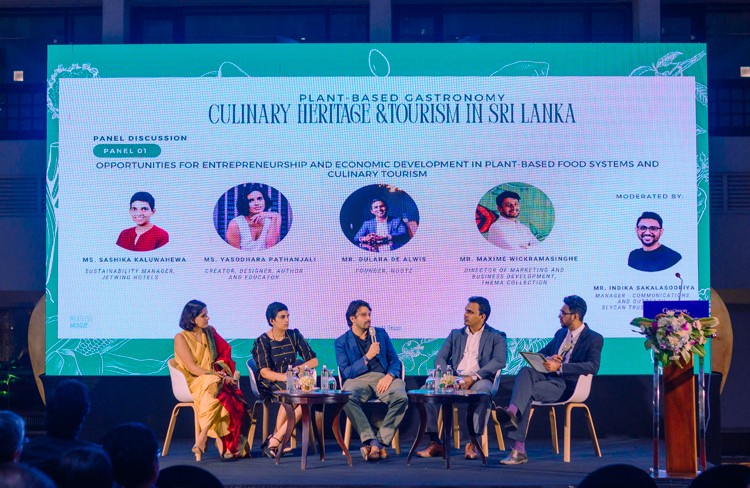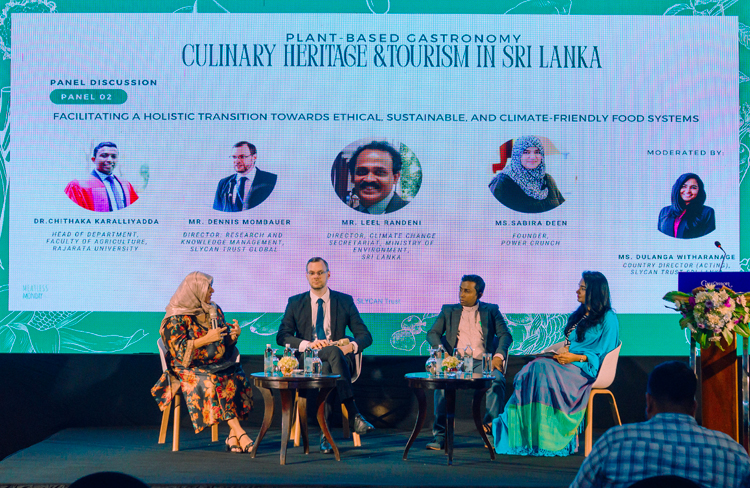SLYCAN Trust and Meatless Monday Sri Lanka highlight Sri Lanka’s plant-based culinary heritage and its role in sustainable tourism, entrepreneurship, and climate action
In celebration of World Vegan Day 2025, SLYCAN Trust, in collaboration with Meatless Monday Sri Lanka, recently hosted a reception titled ‘Plant-Based Gastronomy: Culinary Heritage & Tourism in Sri Lanka.’ The event celebrated the richness of Sri Lanka’s plant-based culinary traditions and explored their potential to drive sustainable tourism, entrepreneurship, and climate action.
Building on the success of last year’s initiative, this year’s reception emphasised how ethical, climate-friendly, and plant-based food systems can foster sustainable economic growth while preserving local culinary heritage. The event brought together government officials, development partners, hospitality leaders, academics, and food and lifestyle media to explore the intersections of culinary tourism, sustainability, and ethical entrepreneurship in Sri Lanka.
A highlight of the evening was the screening of ‘Plant-Based Gastronomy: Culinary Heritage and Tours’, a short video that took the audience on a visual journey across the island, celebrating regional flavours, traditional recipes, and innovative interpretations of plant-based cuisine.
As part of the event, SLYCAN Trust launched the Compendium of Plant-Based Protein Sources in Sri Lanka, a research initiative identifying ten locally available high-protein crops and analyses their potential for developing alternative protein-based products. The compendium aims to strengthen research, support sustainable agriculture, and create new opportunities for entrepreneurs and the hospitality sector.
The insights generated through this publication also contribute to SLYCAN Trust’s broader work on ethical and climate-friendly entrepreneurship under its EthicalX: Climate & Innovation Hub, which supports entrepreneurs and innovators working on climate-friendly food solutions and plant-based products.
The reception also featured two panel discussions. The first, titled “Opportunities for entrepreneurship and economic development in plant-based food systems and culinary tourism”, explored opportunities for economic development and innovation in the country’s growing plant-based food sector. Panelists included Ms. Sashika Kaluwahewa, Sustainability Manager at Jetwing Hotels; Mr. Dulara De Alwis, Founder of Nootz Coconut Smoothies; Ms. Yasodhara Pathanjali, creator, designer, author and educator; and Mr. Maxime Wickramasinghe, Director of Marketing & Business Development, Thema Collection.
While noting that sustainability and plant-based culinary experiences are already an integral part of Jetwing’s offerings, and that the focus now is on further elevating them, Ms.Sashika Kaluwahewa, Sustainability Manager at Jetwing Hotels, stressed the importance of collaboration in driving the plant-based transition.
“Collaboration is key. As a service provider, we rely heavily on external sources for the ingredients we serve, which makes access to knowledge critical: understanding where ingredients come from, how they’re sourced, and how best to prepare them. That is where think tanks and capacity builders like SLYCAN Trust, can play a meaningful role. It’s not only about sharing information but about strengthening capacity across the food system. Producers, consumers, regulators, and policymakers all need to be informed and aligned, to play their part in shaping a sustainable transition.”
Mr. Dulara de Alwis, Founder of Nootz Coconut Smoothies, highlighted the global potential of Sri Lanka’s plant-based ingredients and their scalability to meet rising international consumer demand.
“To scale our plant-based ingredients globally, we need a cycle of innovation, branding, and authenticity. It is essential to showcase the genuine quality of our ingredients and the artisanal craft of our farming and processing communities. With products like our tea, cinnamon, and coconuts, we already have the knowledge and creativity to innovate for the global market.”
The second panel, “Facilitating a holistic transition towards ethical, sustainable, and climate-friendly food systems” addressed the transition toward ethical, sustainable, and climate-friendly food systems, featuring contributions from Dr. Chinthaka Karalliyadda, Head of Department, Faculty of Agriculture, Rajarata University; Mr. Dennis Mombauer, Director: Research and Knowledge Management, SLYCAN Trust Global; and Ms. Sabira Deen, founder of Power Crunch Granola and cohort member of the EthicalX Climate and Innovation Hub.
Mr. Dennis Mombauer, Director of Research & Knowledge Management at SLYCAN Trust Global, commented: “It is crucial to make connections between different actors and processes for a holistic food systems transition. As a think tank, we bridge the gap between businesses, entrepreneurs, policymakers, and investors. By mobilizing insights and evidence, we aim to inform policy processes and guide entrepreneurs to effectively incorporate ethical, sustainable, and climate-friendly practices and business models.”
The reception concluded with a culinary experience curated by Cinnamon Grand’s Executive Chef Mr. Kapila Jayasinghe, featuring a plant-based spread inspired by Sri Lanka’s diverse ecosystems and rich culinary traditions. The menu highlighted locally sourced ingredients, traditional recipes, and contemporary creations that reflected the island’s vibrant plant-based gastronomy.
SLYCAN Trust reaffirmed its commitment to advancing climate-friendly, ethical, and inclusive food systems through continued partnerships, research, and awareness initiatives. The organisation aims to strengthen Sri Lanka’s role as a leader in plant-based culinary tourism, demonstrating how local heritage and innovation can contribute to global solutions for sustainable food systems and ethical entrepreneurship.



Note: This press release has been published on Ada derana business and is available here.
SLYCAN Trust is a non-profit think tank. It has been a registered legal entity in the form of a trust since 2016, and a guarantee limited company since 2019. The entities focus on the thematic areas of climate change, adaptation and resilience, sustainable development, environmental conservation and restoration, social justice, and animal welfare. SLYCAN Trust’s activities include legal and policy research, education and awareness creation, capacity building and training, and implementation of ground level action. SLYCAN Trust aims to facilitate and contribute to multi-stakeholder driven, inclusive and participatory actions for a sustainable and resilient future for all.
SLYCAN Trust and Meatless Monday Sri Lanka highlight Sri Lanka’s plant-based culinary heritage and its role in sustainable tourism, entrepreneurship, and climate action
In celebration of World Vegan Day 2025, SLYCAN Trust, in collaboration with Meatless Monday Sri Lanka, recently hosted a reception titled ‘Plant-Based Gastronomy: Culinary Heritage & Tourism in Sri Lanka.’ The event celebrated the richness of Sri Lanka’s plant-based culinary traditions and explored their potential to drive sustainable tourism, entrepreneurship, and climate action.
Building on the success of last year’s initiative, this year’s reception emphasised how ethical, climate-friendly, and plant-based food systems can foster sustainable economic growth while preserving local culinary heritage. The event brought together government officials, development partners, hospitality leaders, academics, and food and lifestyle media to explore the intersections of culinary tourism, sustainability, and ethical entrepreneurship in Sri Lanka.
A highlight of the evening was the screening of ‘Plant-Based Gastronomy: Culinary Heritage and Tours’, a short video that took the audience on a visual journey across the island, celebrating regional flavours, traditional recipes, and innovative interpretations of plant-based cuisine.
As part of the event, SLYCAN Trust launched the Compendium of Plant-Based Protein Sources in Sri Lanka, a research initiative identifying ten locally available high-protein crops and analyses their potential for developing alternative protein-based products. The compendium aims to strengthen research, support sustainable agriculture, and create new opportunities for entrepreneurs and the hospitality sector.
The insights generated through this publication also contribute to SLYCAN Trust’s broader work on ethical and climate-friendly entrepreneurship under its EthicalX: Climate & Innovation Hub, which supports entrepreneurs and innovators working on climate-friendly food solutions and plant-based products.
The reception also featured two panel discussions. The first, titled “Opportunities for entrepreneurship and economic development in plant-based food systems and culinary tourism”, explored opportunities for economic development and innovation in the country’s growing plant-based food sector. Panelists included Ms. Sashika Kaluwahewa, Sustainability Manager at Jetwing Hotels; Mr. Dulara De Alwis, Founder of Nootz Coconut Smoothies; Ms. Yasodhara Pathanjali, creator, designer, author and educator; and Mr. Maxime Wickramasinghe, Director of Marketing & Business Development, Thema Collection.
While noting that sustainability and plant-based culinary experiences are already an integral part of Jetwing’s offerings, and that the focus now is on further elevating them, Ms.Sashika Kaluwahewa, Sustainability Manager at Jetwing Hotels, stressed the importance of collaboration in driving the plant-based transition.
“Collaboration is key. As a service provider, we rely heavily on external sources for the ingredients we serve, which makes access to knowledge critical: understanding where ingredients come from, how they’re sourced, and how best to prepare them. That is where think tanks and capacity builders like SLYCAN Trust, can play a meaningful role. It’s not only about sharing information but about strengthening capacity across the food system. Producers, consumers, regulators, and policymakers all need to be informed and aligned, to play their part in shaping a sustainable transition.”
Mr. Dulara de Alwis, Founder of Nootz Coconut Smoothies, highlighted the global potential of Sri Lanka’s plant-based ingredients and their scalability to meet rising international consumer demand.
“To scale our plant-based ingredients globally, we need a cycle of innovation, branding, and authenticity. It is essential to showcase the genuine quality of our ingredients and the artisanal craft of our farming and processing communities. With products like our tea, cinnamon, and coconuts, we already have the knowledge and creativity to innovate for the global market.”
The second panel, “Facilitating a holistic transition towards ethical, sustainable, and climate-friendly food systems” addressed the transition toward ethical, sustainable, and climate-friendly food systems, featuring contributions from Dr. Chinthaka Karalliyadda, Head of Department, Faculty of Agriculture, Rajarata University; Mr. Dennis Mombauer, Director: Research and Knowledge Management, SLYCAN Trust Global; and Ms. Sabira Deen, founder of Power Crunch Granola and cohort member of the EthicalX Climate and Innovation Hub.
Mr. Dennis Mombauer, Director of Research & Knowledge Management at SLYCAN Trust Global, commented: “It is crucial to make connections between different actors and processes for a holistic food systems transition. As a think tank, we bridge the gap between businesses, entrepreneurs, policymakers, and investors. By mobilizing insights and evidence, we aim to inform policy processes and guide entrepreneurs to effectively incorporate ethical, sustainable, and climate-friendly practices and business models.”
The reception concluded with a culinary experience curated by Cinnamon Grand’s Executive Chef Mr. Kapila Jayasinghe, featuring a plant-based spread inspired by Sri Lanka’s diverse ecosystems and rich culinary traditions. The menu highlighted locally sourced ingredients, traditional recipes, and contemporary creations that reflected the island’s vibrant plant-based gastronomy.
SLYCAN Trust reaffirmed its commitment to advancing climate-friendly, ethical, and inclusive food systems through continued partnerships, research, and awareness initiatives. The organisation aims to strengthen Sri Lanka’s role as a leader in plant-based culinary tourism, demonstrating how local heritage and innovation can contribute to global solutions for sustainable food systems and ethical entrepreneurship.



Note: This press release has been published on Ada derana business and is available here.